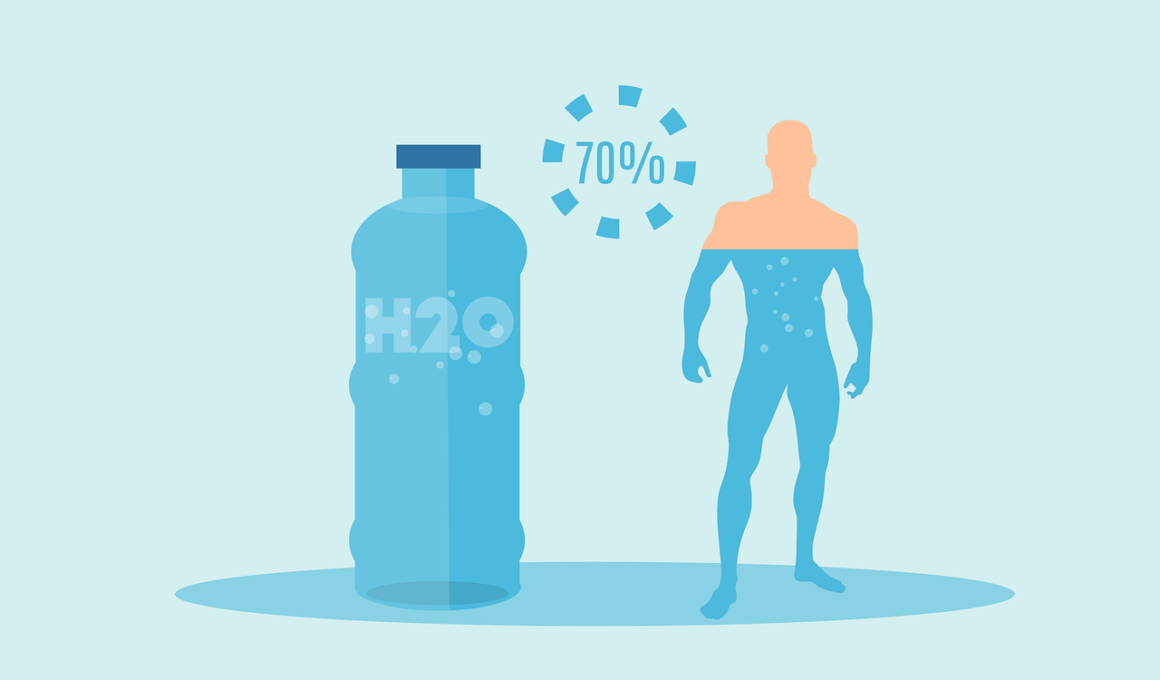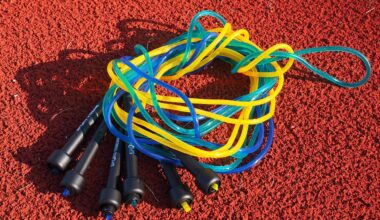The Role of Caffeine in Daily Water Intake for Active Individuals
Hydration is crucial for individuals who maintain an active lifestyle. Daily water intake recommendations suggest that men should consume about 3.7 liters, while women should aim for approximately 2.7 liters of total water from all beverages and foods. Caffeine, often included in beverages like coffee and energy drinks, has often been debated regarding its impact on overall hydration. Some studies indicate caffeine causes mild diuretic effects; however, regular consumers may develop tolerance to this effect. It is essential, therefore, to consider overall fluid consumption rather than focusing solely on caffeine sources. The benefits of caffeine in terms of energy and performance enhancements can still be compatible with hydration strategies. Mixing caffeinated drinks with water can provide a balanced approach, allowing users to stay hydrated while benefiting from caffeine. Active individuals might find that including caffeinated beverages helps them feel more energized and alert. Ultimately, moderation is key and staying attentive to the body’s signals can help maintain hydration. This ensures that caffeine can be part of a hydration strategy without sacrificing overall fluid intake.
In understanding hydration strategies, it’s vital to recognize the types of fluids consumed. Not all liquids contribute equally to hydration. For instance, caffeinated drinks like coffee, while enjoyable and stimulating, can potentially contribute less effectively to total hydrating efforts compared to water. Surprisingly, caffeine is present in many appealing beverages such as iced teas, energy drinks, and sodas. These drinks can still hydrate but typically come with added calories or sugar, complicating hydration decisions. When assessing your hydration strategy, it’s critical to evaluate how much caffeine-containing beverages contribute to daily fluid intake. In fact, the overall balance of one’s daily fluid consumption plays a more important role than simply isolating caffeine effects. Active individuals should aim to consume adequate water throughout the day, especially before, during, and after exercise. A practical hydration strategy will include diverse fluid sources, mixing caffeinated options with plain water. This balance allows for energy boosts without jeopardizing hydration. Experimentation with personal tolerance levels can aid individuals in fine-tuning their hydration strategy.
Balancing Caffeine and Hydration
To effectively manage hydration alongside caffeine intake, individuals engaged in extensive physical activities should develop a personalized hydration plan. This plan should account for varying factors such as exercise duration, intensity, and local climate conditions. During extended physical activities, fluid losses increase significantly, necessitating replacements beyond typical hydration needs. Studies suggest that sports drinks with electrolytes mixed with a moderate amount of caffeine can support hydration during vigorous activities. Monitoring signs of dehydration is essential; symptoms include fatigue, thirst, and dry mouth. Furthermore, maintaining an optimal hydration status becomes increasingly important during long workouts or competitive events. Active individuals might consider drinking electrolyte-enriched beverages that include caffeine as this can support both hydration and performance levels. Water, while fundamental, may not always suffice in unique situations. Recognizing personal hydration requirements is crucial to achieve peak performance. Individuals can experiment with a combination of water and caffeine-containing beverages to discover their preferred balance. This adaptive approach can provide optimal hydration while enjoying the stimulating effects of caffeine, ensuring physical activity does not compromise health or performance.
Moreover, active individuals should stay informed about their caffeine consumption, especially when it comes to endurance sports. Research suggests that caffeine can enhance athletic performance, supporting increased endurance and reduced perceived effort during activities. Consuming caffeine responsibly before sports events may be beneficial, allowing athletes to gain that extra boost. However, the timing and the amount consumed hold significant importance in determining its hydrating impact. Knowing how your body reacts to different forms of caffeinated beverages will influence the effectiveness of your hydration strategy. For example, some athletes find that coffee before work can improve their focus, but consuming it too late may affect sleep and subsequent hydration the next day. To fine-tune applied strategies, athletes can log their caffeine intake to assess its effects on performance and hydration. This awareness can help develop an optimal hydration approach moving forward. Experimenting during practice, rather than on race day, is key in refining the balance between caffeine and hydration. Overall, understanding personal limits will aid tremendously in enhancing individual hydration strategies.
Choosing the Right Caffeinated Beverages
Selecting the right caffeinated beverages aids in maintaining hydration goals for active individuals. While options are plentiful, making informed choices can contribute to better hydration. Some drinks, like certain teas, provide antioxidants, which can have additional health benefits. Sports drinks can also provide hydration benefits alongside electrolytes, but one must select those with lower sugar content to avoid excessive calorie intake. Ideally, hydration strategies should prioritize water first and seek caffeine as an additional support option for those demanding physical tasks. Moderation in caffeinated drinks helps reduce potential risks of dehydration related to excessive intake. Be mindful of portion sizes and time your consumption strategically; consuming significant amounts of caffeine right before intense exercises may lead to adverse effects. Explore various caffeinated beverages cautiously, experimenting to see which amount feels most beneficial. Pairing these drinks with appropriate water intake can help maintain hydration, especially during rigorous activities. Caffeinated beverages may present enjoyable alternatives, but they should not replace water, which remains integral in every hydration strategy.
Lastly, the incorporation of hydration tips into daily routines can aid in maintaining effective caffeine consumption without sacrificing water intake. Strategies can include carrying a refillable water bottle throughout the day and consuming fluids regularly, creating a habit of staying hydrated. Setting reminders can be particularly useful for individuals who easily forget to drink enough water and instead might rely on caffeinated beverages. In addition to drinking water, it’s advisable to include foods with high water content in the diet, such as fruits and vegetables. For instance, cucumbers, oranges, and strawberries are refreshing and hydrating options that complement daily fluid intake. Preparing electrolyte-rich snacks can also assist in balancing hydration, supporting those consuming caffeine. Engaging with communities sharing similar hydration goals can provide motivation and new insights into effective practices. By fostering accountability, active individuals can improve their overall hydration strategies. Emphasize water intake while enjoying caffeine responsibly, allowing balance to reign supreme in daily hydration efforts.
The Bottom Line
In summary, caffeine can play a role within daily water intake recommendations for active individuals. Balancing hydration needs with caffeine consumption is achievable by evaluating personal preferences and demands. The key to hydration lies in understanding how different fluids affect overall beverage intake and adjusting accordingly, whether that means including delicious iced coffee or flavorful herbal tea. Individuals are encouraged to experiment to detect how various caffeinated beverages impact their hydration levels and athletic performance. Developing customized hydration strategies while incorporating caffeine can enhance not just physical performance but also overall well-being. Fostering awareness surrounding proper hydration enables active individuals to enjoy the benefits of caffeine without sacrificing necessary fluid requirements. Adhering to the recommended daily intake will help ensure health and vitality, particularly during times of increased physical activity. Lastly, hydration remains a cornerstone for wellness, with caffeine merely a supportive element, making clear choices essential to achieving personal hydration strategies.
Finally, embracing hydration strategies ensures that both fluids and nutrients sustain physical activities effectively. Progress on hydration goals can lead to improved energy levels and well-being, enabling individuals to thrive in their active lifestyles. Caffeine should complement, not complicate, these hydration efforts, leading to an energetic and refreshed state. Embracing a diverse range of beverages and hydrating foods will support daily hydration needs. Tracking daily fluid intake, apps can help organize and visualize hydration efforts, ensuring active individuals meet personal targets. This commitment to hydration helps nurture overall health. View hydration as a vital component for athletic performance, where caffeine is an accessory that can boost energy and enjoyment. Overall, the successful ongoing balance of caffeine and hydration creates a sustainable healthy lifestyle. Recognizing individual hydration preferences will enhance both experiences and results. Make hydration a priority and adapt accordingly for lasting positive outcomes in every active pursuit. Enjoy hydration strategies that allow caffeine intake while emphasizing water as the primary source of hydration. A true balance leads to well-rounded health and energetic fulfillment.


